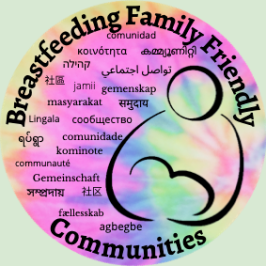CGBI: Breastfeeding Family Friendly Community Designation
Background
In 2011, the Surgeon General’s Call to Action to Support Breastfeeding highlighted a need for a community level, multifaceted approach to breastfeeding support.
A parent’s decision to chest/breastfeed an infant should be supported by the family and community. Most families initiate breastfeeding in the hospital; however, many stop breastfeeding within a few days or weeks. Therefore, the BREASTFEEDING FAMILY FRIENDLY COMMUNITY DESIGNATION (BFFCD) recognizes the importance of a welcoming environment that supports a family to continue breastfeeding, chestfeeding, and human milk feeding. BFFCD complements and broadens the scope of the World Health Organization and UNICEF Baby-friendly Hospital Initiative Ten steps to successful breastfeeding to improve lactation duration.
Exclusive breastfeeding has been referred to as “The Great Equalizer”, because (it) “goes a long way toward canceling out the health difference between being born into poverty or being born into affluence” (JP Grant, when UNICEF Executive Director). As “The Great Equalizer”, chest/breastfeeding also impacts health equity outcomes at all ages and stages of life. The Breastfeeding Family Friendly Communities Designation sends the message that the community respects a family’s desires and appreciates the benefits of breastfeeding for the health of the child, the mother, the family, and the community.
THE PILOT INITIATIVE
The Breastfeeding Family Friendly Community Designation (BFFCD) initiative has its roots in a request from the World Alliance for Breastfeeding Action (WABA) to develop a community breastfeeding program that can be used to strengthen breastfeeding support and normalization.
A pilot designation program was launched in 2015 to expand breastfeeding-friendly practices in Chapel Hill and Carrboro, NC. The BFFCD team included the Carolina Global Breastfeeding Institute, Chapel Hill- Carrboro Chamber of Commerce, Chapel Hill Rotary, Inter-Faith Council for Social Services (IFC), La Leche League of Chapel Hill (LLL), Office of the Mayors of Chapel Hill and Carrboro, Orange County Department of Health, and faith-based groups.

Breastfeeding Family Friendly Communities global logo
Check out the growing list of communities working towards the designation.
For information and resources to support your community to become breastfeeding friendly, visit the Breastfeeding Family Friendly Communities website.
To learn more about starting the journey in your community, reach out! contact@breastfeedingcommunities.org
Ten Steps to a Breastfeeding Family Friendly Community
1. The community’s elected or appointed leadership has a written statement supporting breastfeeding that is routinely communicated to all.
2. The community as a whole provides a welcoming atmosphere for chest/breastfeeding families.
3. Optimal chest/breastfeeding is supported by health leadership.
4. During pregnancy, all families in the community are informed about the benefits of chest/breastfeeding, as well as about the risks of unnecessary formula use, and where to access support as needed.
5. Health care in the community is chest/breastfeeding-friendly.
6. Community chest/breastfeeding support groups and lactation services are fully available, including peer-to-peer lactation support providers, International Board Certified Lactation Consultants (IBCLCs), and other skilled chest/breastfeeding support.
7. The businesses and organizations in the community welcome chest/breastfeeding families.
8. Local businesses and healthcare clinics/offices follow the principles of The International Code of Marketing of Breast-Milk Substitutes.
9. The World Alliance for Breastfeeding Action (WABA) maternity care and employment or, in the US, The US Business Case for Breastfeeding is promulgated by the government and the Chamber of Commerce or equivalent.
10. Education systems, including child care, K-12, colleges and universities, are encouraged to include chest/breastfeeding-friendly curricula at all levels.
Download the expanded document, the Global Criteria, that includes the Ten Steps with background information, FAQs, suggested approaches, and measures for each step.
RESOURCES
Breastfeeding Family Friendly Community website
The Ten Steps to a Breastfeeding Family Friendly Community
